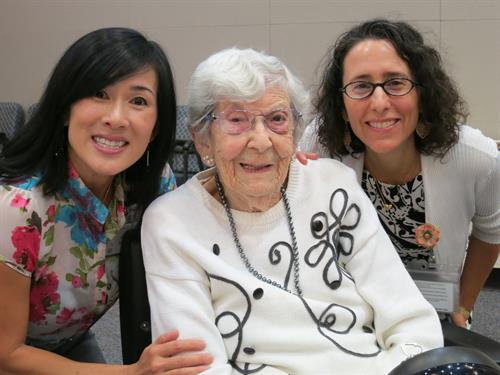Posted By
Nanci Levy
| Mar 12, 2022
 Death is a delicate subject. Most people don’t like to talk or think too much about it, even though it is something that we all have in common. But when you spend your time caring for the elderly, it is not a subject you can avoid. The reality is that we are confronted with death all too often. We all need to find ways to cope with the loss, despite the fact that most people are not even comfortable talking about it.
Death is a delicate subject. Most people don’t like to talk or think too much about it, even though it is something that we all have in common. But when you spend your time caring for the elderly, it is not a subject you can avoid. The reality is that we are confronted with death all too often. We all need to find ways to cope with the loss, despite the fact that most people are not even comfortable talking about it.
Developing affection for the people who we care for is natural and normal. One of the greatest joys of working with the elderly is getting to know and learn from them, but these very connections that we make are what makes saying goodbye so difficult. When dealing with death so frequently, we need to find coping mechanisms that don’t make us too numb to the pain, or conversely, allow our emotions to overwhelm us so that we cannot function. We have to do this, because we are at work. So, how do we manage? How do we cope?
Examples in every culture of practices to mourn loved ones
We can look to and learn from how people mourn their loved ones in nearly every culture and faith. Most practices include rituals for honoring the dead, and customs to help those in mourning to work through the grief. Many of these customs and rituals include bringing people together to help as part of the healing process.
For example, it is customary in the Jewish faith for the mourners to invite members of their community to a memorial service to honor those who have passed. After the burial, there are some customs that are usually followed during the first year of mourning. During the Shiva period, the first week after burial, mourners remain at home and receive visits or condolence calls from friends, family and members of the community. The visits usually incorporate prayer, meals and other support for the mourners. The Sheloshim period, the first 30 days after burial, includes daily recitations of the Kaddish prayer, as well as some restrictions on what the mourners are permitted to do as they ease back into life. And beginning on the one year anniversary, the Yahrzeit, the Kaddish is said, and acts of Tzedakah (just and charitable deeds) are often performed by the mourner in their loved one’s memory on the first anniversary.
These rituals give mourners a foundation for honoring and remembering their loved ones, for working through their grief, and getting back to life.
Give yourself time to feel, to grieve
While sometimes we are fortunate enough to be able to attend the memorial services for residents who we are grieving, most often we have to find our own way through it. So how do we? I have found that it is important for me to give myself some time to grieve, to allow myself to feel the sense of loss so that it does not get buried too deep inside, and so that I do not get too numb to the pain.
Find a way to personally memorialize them
It is often helpful to find some quiet time, even if it’s just a few minutes, to think about the resident who has passed. One of the things that I tend to do is look through photos that I may have of the resident. It’s my own way of memorializing them, and it helps to remind me of conversations and moments that we shared. Sometimes, if the resident has family members who I have gotten to know, I may speak with them or message them, and sometimes even share some of the photos that I have with them.
And then get back to life
And then I get back to my day. But that does not mean that I forget them. Little things are likely to remind me of them, and their absence will be felt for a long time.
We all have to find our own way to mourn and to cope, and this has become mine.
It’s not an easy business saying goodbye to someone who has touched your life, even if it was only for a relatively short period of time. But whatever pain of loss is felt, it is well worth the time spent with them; learning from and about them, seeing their joys, and even their frustrations and pains.
Yes, death is a delicate subject, one that we don’t like to discuss, but the more that we confront it, the more we can hopefully come to terms with it. There is often fear associated with dying; I know that I still have some fear of it. But, when you are able to observe others leaning into it gently, seemingly preparing themselves for the inevitable, it starts to become a little less scary. And maybe if, G-d willing, I reach 100 years old, as one resident who we recently lost was, I will feel somewhat more prepared for what he would jokingly refer to as “the big sleep”.